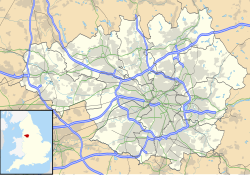Church of St Mary the Virgin, Prestwich
| Parish Church of St Mary the Virgin, Prestwich | |
|---|---|

St Mary's from the southwest
|
|
| Coordinates: 53°31′46″N 2°17′12″W / 53.5294°N 2.2866°W | |
| OS grid reference | SD 811,037 |
| Location | Church Lane Prestwich Greater Manchester |
| Country | England |
| Denomination | Anglican |
| Website | St Mary's Church Official Page |
| History | |
| Dedication | Virgin Mary |
| Architecture | |
| Status | Parish church |
| Functional status | Active |
| Heritage designation | Grade I |
| Designated | 30 June 1966 |
| Architect(s) |
Paley, Austin and Paley (1888–89 alterations) |
| Architectural type | Church |
| Style |
Gothic Gothic Revival |
| Administration | |
| Parish | Prestwich |
| Deanery | Radcliffe and Prestwich |
| Archdeaconry | Bolton |
| Diocese | Manchester |
| Province | York |
| Clergy | |
| Priest(s) | Revd Chris Wedge |
| Laity | |
| Organist(s) | Gary Hulme ARCO LTCL |
The Church of St Mary the Virgin is on Church Lane, Prestwich, Greater Manchester, England. It is an active Anglican parish church in the deanery of Radcliffe and Prestwich, the archdeaconry of Bolton and the diocese of Manchester. The church is recorded in the National Heritage List for England as a designated Grade I listed building.Pevsner refers to it as "a major church".
Prestwich is not mentioned in the Domesday Book, but there is evidence of a church on the site since at least 1200. The tower was built in about 1500 by the 1st Earl of Derby, and the body of the church was rebuilt during the early part of the 16th century. In 1756 the south porch was rebuilt and the walls of the aisles were raised. The east vestry was rebuilt in 1803 and in 1860 the chancel was extended. In 1872 a new chapel, the Birch Chapel, was added to the south of the chancel and to the east of the existing south (Lever) chapel; the Lever Chapel was rebuilt two years later. In 1888–89 the Lancaster architects Paley, Austin and Paley rebuilt the north (Wilton) chapel and the chancel, and added an organ chamber and a vestry on the north side of the chancel. The north porch dates from 1895. The north and south galleries were removed in 1959.
The church is constructed in red sandstone with stone slate roofs. Its plan consists of a five-bay nave with a clerestory, a three-bay chancel with a clerestory rising higher than that of the nave, north and south aisles, north and south porches, and a west tower. The two eastern bays of the north aisle comprise the Wilton Chapel, the work of Paley and Austin in 1872. There is some doubt as to whether it is original Paley and Austin or a rebuild of something earlier. Of this chapel Pevsner writes "the uncusped tracery is almost convincing Henry VIII but not quite." Beyond the Wilton Chapel are the organ chamber and the choir vestry. On the south of the church the Lever Chapel occupies a corresponding position to the Wilton Chapel, and to the east of this is the Birch (or Lady) Chapel. The tower is in three stages and rises to a height of 86 feet (26 m). It has a buttress at each corner, and a stair turret in the northeast corner. In the bottom stage is a doorway above which is a three-light window. In the middle stage on the west side is a two-light square-headed window. At a higher level in this stage are clock faces on the north, south and east sides. A reference in the churchwarden’s accounts notes that there was a clock in the tower in 1656. The top stage contains a three-light louvred bell opening on each side, and above them a string course with gargoyles. At the top of the tower is an embattled parapet, and it is surmounted by a pyramidal roof with a weathervane. Both aisles have two , tracery-less, three-light windows and above them are three three-light square-headed, mullioned windows. At the west end of the north aisle is a Decorated two-light window, and at the west end of the south aisle the window has three lights. The clerestory has a range of two-light square-headed windows on each side. The Lever chapel has two four-light windows, and in the Wilton chapel are three three-light windows. The east window of the chancel has seven lights and contains Perpendicular tracery. The south porch is dated 1756.
...
Wikipedia

